This piece is different, but it’s something I’ve been wanting to write for a year or so. It’s not about the media or politics. It’s about me, and my cancer diagnosis two years ago. There’s no media angle, here, so if you’re not interested in reading this, I understand. I’ve never been a big fan of biographies.
But I haven’t done a good job of sharing this story, even though it’s an indelible part of me, and the writer and person that I am. It’s uncomfortable for me to share, but I want to try: both for myself and in the off chance that it helps someone else.
Two years ago, the day after my 30th birthday, I was diagnosed out-of-the-blue with an inoperable brain tumor. After chemotherapy, radiation, and more than my fair share of good luck, I’m one year cancer-free. I’d like to take you through what happened.
For context, I’ve been pretty healthy my entire life: a couple broken bones, run of the mill sicknesses, usual kid stuff. I’ve always been decently active. And I’ve never been good about going to the doctors (or dentists or specialists).
Getting sick: So when I started getting headaches and vision issues in early 2022, I assumed it was nothing. I was closing in on my 30th birthday, so maybe this was part of getting older: lower back pain, writer’s edition.
My girlfriend encouraged me to go to a neurologist. At that point, we had been together for 2 years, and I should’ve taken her advice.
But I was changing jobs — going from public affairs to trying my hand at being a real journalist rather than just writing (okay, tweeting) about them — and I was focused on handing off my old clients and teams in a way that wasn’t disastrous, and trying to get my arms around writing for a living. Plus, we were in the process of moving, so any free time went to putting things in boxes.
The headaches got worse. At first it was a dull, achey pain in the back of my head. By April 2022, that pain had intensified, and I started to feel my vision worsen. Between jobs I drove down to North Carolina to go fishing. I’m not good at fishing. It’s generous to say I even know how to fish. But I can string a lure and like sitting out on a dock, listening to country music and not doing anything. Fishing is calming.
I didn’t catch anything on that trip. But the view was beautiful.
I got back to DC feeling fine by my new standards. The next morning, I couldn’t get out of bed. I had a blinding headache. I had two interviews I had to cancel at the last minute. The next day, that same awful headache came back. I started setting my alarm early and taking Excedrin an hour before I needed to wake up so I could function. My balance felt off. I started describing my bad days as “dizzy days.”
My girlfriend, not surprisingly, got more insistent about the neurologist. I told her I would go to the eye doctor (maybe the issue is my contacts, I remember thinking) once my new insurance kicked in.
In the meantime, we were busy. We had a wedding in Omaha (but we drove from Kansas City, through a tornado, because it was the weekend of Warren Buffett’s conference, making flights insanely expensive), another in New York, and I had a birthday party in Las Vegas where a sandstorm grounded flights and caused me to sleep in the airport, eventually going straight to work that next Monday morning. Not the best decision making on my part.
My condition deteriorated. I started to have difficulty turning my head. I was exhausted all the time. I finally got to the eye doctor — my first visit with a new ophthalmologist. He was incredible, and we had a wonderful, easy-going appointment, until we got to the eye health part of the exam.
I told him I had been having headaches. He took a look behind my eyes with some fancy machine. Our light-hearted banter stopped. His instructions — turn your head, look this way — were more direct. Eventually, he flipped around the image he was looking at so I could see it.
He told me I was hemorrhaging around my optic nerves. I needed to see an ER doctor, like yesterday. I asked him for a referral (my good medical fortunes meant that, up until this point, I was not very aware of how the medical system worked). He told me to sit in the waiting room. He was calling me an ambulance.
He might’ve saved my life. He almost certainly saved my vision.
I got to the emergency room and an MRI confirmed the hemorrhaging. They held me overnight and woke me up around 3 AM to tell me it was likely either cancer, an aneurism, or a congenital condition…maybe M.S. Tough news to hear a few months before you turn 30.
More tests over the next week indicated the problem may be a more mundane congenital condition preventing me from reabsorbing my cerebrospinal fluid. I needed brain surgery within the month or I could lose vision in one or both eyes. The hospital discharged me and told me to get a couple second opinions on where to do the surgery. And take it easy.
Brain surgery: But I didn’t turn my full attention to my health situation, as I should have, in retrospect. l was only six weeks into my new journalism career, and had just missed a week of learning the ropes because I was in the hospital. Plus, my girlfriend and I were barreling toward our new apartment move-in date, and both of us had lost a week of packing: me in the hospital, my girlfriend coming to visit me while still going to work and taking care of the dog.
I jumped back into work and packing. I felt a little better; a spinal tap reduced the pressure and the knowledge that this weird health thing would soon be resolved helped a lot. When the move came, the movers we had hired got about 75 percent of our belongings, and five trips between old and new apartments by the two of us got the rest. We finished around 3 AM. I didn’t take it easy like I was supposed to: we had to move, on a deadline, and heavy things needed lifting.
I went into the office the next day. Two donuts and too much coffee later, my legs went out from under me in the work hallway. I was bedridden for two days. Eventually my girlfriend got me to the emergency room. The doctors decided on an emergency brain surgery.
I had great doctors. The surgery went perfectly. I wasn’t allowed to lift my head for a few days. But after about a week I was feeling better.
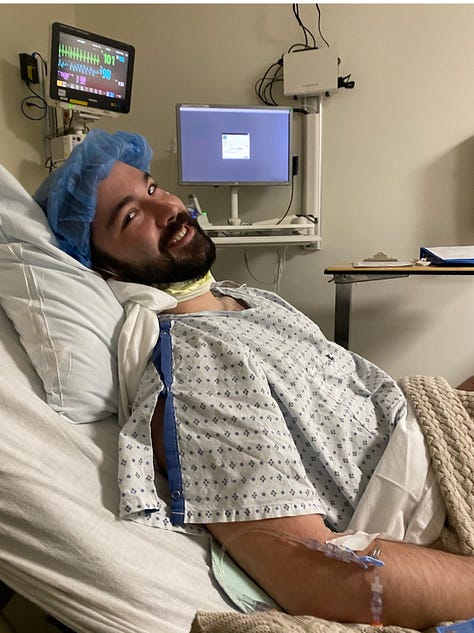
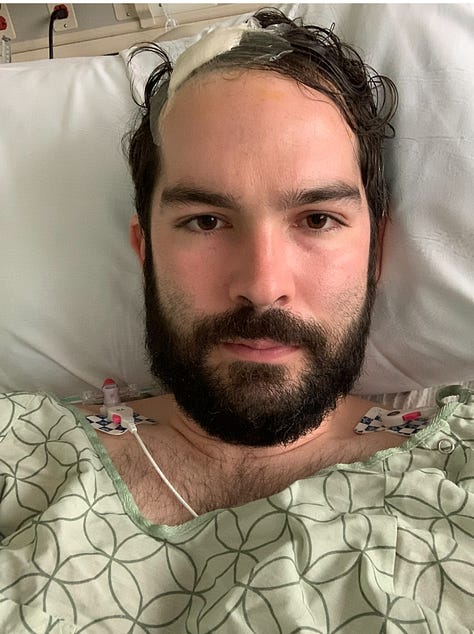

My mom (from Boston) and my girlfriend’s mom (from LA) both came out to help take care of me and get us situated in the new apartment.
After a week or so I was starting to feel a little more normal. I was getting ready to go back to work. All I had left was a follow up MRI to make sure there wasn’t serious residual bleeding. By then I was a pro at MRIs — they had given me a bunch in my hospital stint.
I was back in the gym. I even went for a run (more like a light jog).
But the MRI didn’t go as planned. My neurosurgeon saw a shadow. He wasn’t sure what it was, but he thought it could potentially be a small tumor. Better to be safe about it. He referred me to another hospital to get it looked at by someone with more experience with the types of tumor that it might be.
We rented a car and my girlfriend drove me up to Baltimore. We talked to another neurosurgeon. He told us he thought the shadow was likely residual bleeding from the surgery but he wanted to take another look with other surgeons to confirm.
We were incredibly relieved. We drove back to DC thinking we had dodged a bullet. We passed out on the couch when we got home, optimistic that this bizarre health adventure — forget brain worms, the ‘needed brain surgery’ jokes write themselves — was coming to a close.
We woke up an hour later to a call from the neurosurgeon. Further review made the team confident it was probably a tumor. They’d need more tests to definitively confirm, but they were going to connect me to the oncology team and get me started with chemotherapy because the imaging made it clear that, if it was a tumor, it was inoperable, smack in the middle of my brain. Time was, once again, of the essence. A return to normal life — something that seemed so imminent moments before — was back on hold.
It was the day after my 30th birthday.
Cancer: Cancer is, if you’ll pardon the phrase, a funny word. Few words in the English language are more evocative of a set of emotions and fears and feelings. Hearing that you — not someone else, not an elderly relative, not someone special or sickly — but you, an ordinary, now-30 year old had it was disorienting.
What could possibly have led to this, I couldn’t help but wonder. The answer, as I understand it, was both vague and unsatisfying: a freak coincidence in utero, making my brain something of a ticking time bomb. Again, the jokes write themselves. (An aside: trying to keep a healthy sense of humor amid the weirdness and darkness of all of this, particularly since it the story gets happier, has helped me.)
Medically, I had three choices:
Opt for a stronger dose of craniospinal chemotherapy, followed by radiation, that would take a harsher toll on my body but was more likely to wipe out the tumor;
Decide on a milder dose of chemo, also followed by radiation, which would be more tolerable but perhaps less effective; or
Die a likely unpleasant death.
I decided to go with the first course. If I had to do the whole chemo thing, better to not miss the tumor, I figured. I had a port put in my chest to facilitate the treatments and got started in September 2022.
Every Monday, I went in for a quick treatment. Every third week, I had eight hours of chemo, Monday through Friday, hooked to an IV line. I’ve heard of people who continue working though this type of treatment. I was lucky that I didn’t have to — my employer at the time was incredibly understanding and I went on disability. During treatment I watched House of Dragons (disappointing) and the last two seasons of Peaky Blinders (too dark for me by the end, and a little too close to home). I tried reading but 1) I was exhausted and 2) my chemo led to some visual side effects. I was in this stage of treatment for about 4 months.
As you may have noticed from some recent interviews, I lost my hair. But my doctor says it’s coming back. And buzzing it was easy (my girlfriend did it, to be fair).
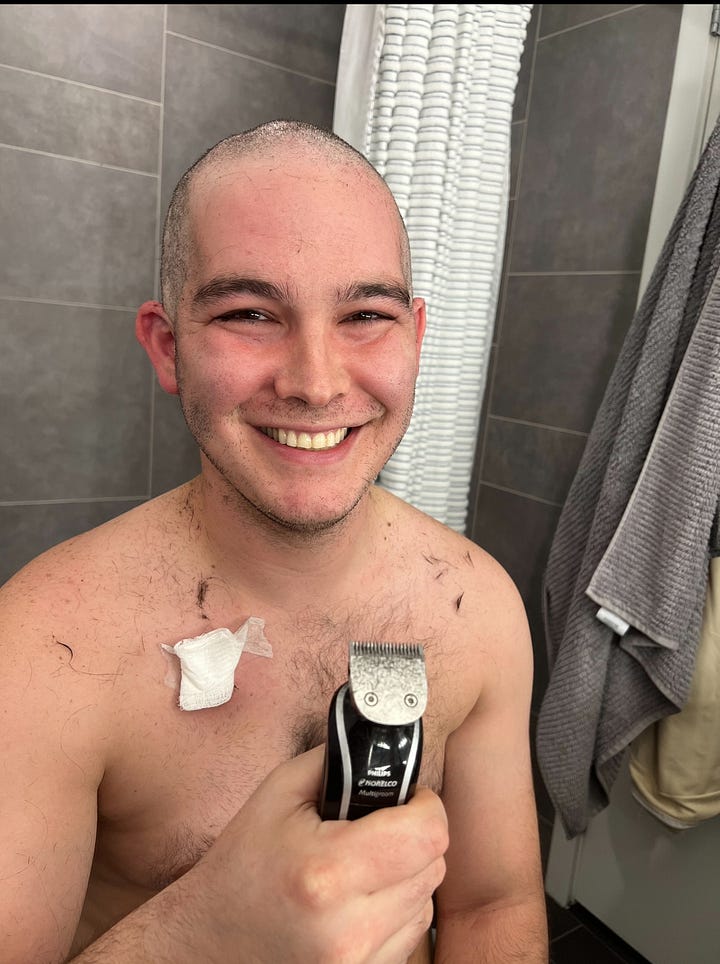

I got really lucky that my body responded to the chemo as well as it did. I didn’t get sick during treatment. I definitely put on some weight but could still walk the dog and help out with household chores. I put up our Christmas tree.

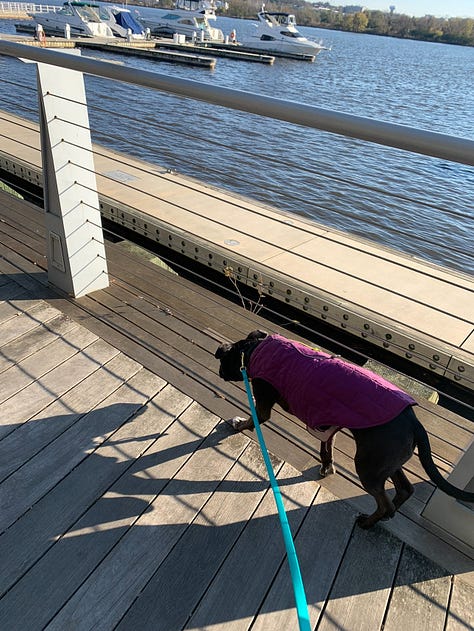
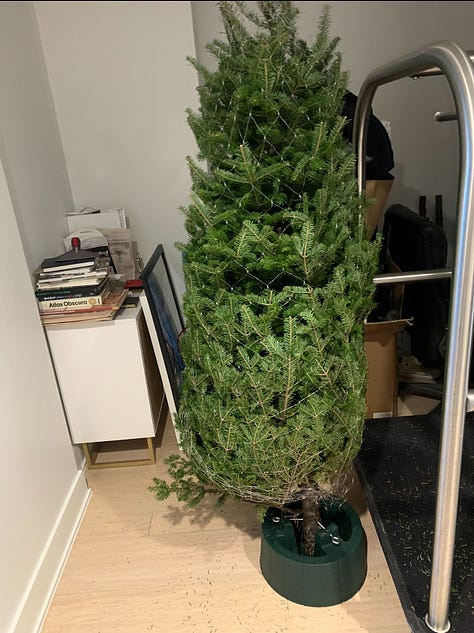
I even made it up to Massachusetts for Thanksgiving to see my parents and my brother.
It wasn’t a walk in the park. I couldn’t have done it without my girlfriend picking up all the slack around our apartment, cooking nearly all of our meals and being my rock throughout an experience that was objectively terrifying. I continue to stand in awe of her level-headedness and resolve in a slow-burn moment of crisis. Having a supportive family who were there for me every step of the way was invaluable. (And if you or a loved one are going through cancer treatment, this cookbook, The Cancer-Fighting Kitchen, which my folks got me, was really a Godsend).
My faith helped get me through, too. Mass went from a chore to something I craved. For maybe (I’m ashamed to say) the first time in my life, I leaned on God and prayer for help. I was included in more Prayers of the Faithful than I could have asked for. I struggle sometimes to connect prayer to tangible outcomes. But this experience was an enormously valuable lesson in the power of prayer.
And the chemo was super effective. Halfway through, the tumor had shrunk almost 90 percent in size. There weren’t any indications that it had spread. After the initially planned four sessions, I got to ring the bell, and it was on to radiation.
Luckily, radiation was much the same. My body tolerated it really well. It was unbelievably comforting to know that the scans from chemo were encouraging. I got back in the gym (not running this time, though) and started to feel better, more normal. I started to look more normal, too.
I was stunned, again, walking out of the center each morning, by the people who appeared to undergo radiation and then go about their regular lives.
After six weeks of daily radiation, I had completed my treatment program. Another bell ringing was in order.
A month or two later, I had follow up MRIs post-treatment. The results: no evidence of tumor. The cancer was gone. I was in remission.
Remission: That isn’t to say that I was then or am now entirely out of the woods: that isn’t, as I understand it, quite how cancer works. I’m still recovering from chemo. My balance and coordination — never great strengths — are still works in progress. My short term memory still lags, and I’m still more tired than I used to be (although my ability to remember and tell stories, particularly about moments the press got something wrong, has thankfully seemed to remain.
I have neuropathy in my hands that causes my fingers to go white and numb when they get cold. My skin is more sensitive to sunlight. I still get dizzy sometimes. Many of these things are long-term side effects from chemo that I’m learning to manage.
But I am managing. Normal life may never completely come back, but I’m working full-time, and launched this newsletter. I’m back doing TV hits (and even cutting them and posting them on the Instagram page I made for this newsletter, link here).
I practiced some tennis ground strokes at physical therapy and surprised myself. I’m able to dance badly at weddings again (my love for dancing has long outstripped my ability to do so).
I’m back to running once a week. A couple weeks ago I did the PNC Classic 5K and finished only 6 seconds per mile slower than my 5k PR — from 2021, well before the cancer diagnosis.
I hope this doesn’t sound braggadocious. I couldn’t have done it without the love and support and prayers from too many people to count (and a fantastic medical team, including physical therapy after treatment). I don’t know how long this part of the journey will last. But I’m proud of where I am today.
The takeaway: It feels like the journey should’ve left me with something more profound in the way of advice. Maybe it will in time. The one bit I keep coming back to, from an old mentor of mine, has been to take more time to slow down and appreciate the little things — smell the roses, if you will. I still don’t do it as often as I should, but I’m doing it more. I can’t recommend it highly enough. Having a dog who also seems to like appreciating the beauty of a sunset or the water helps.
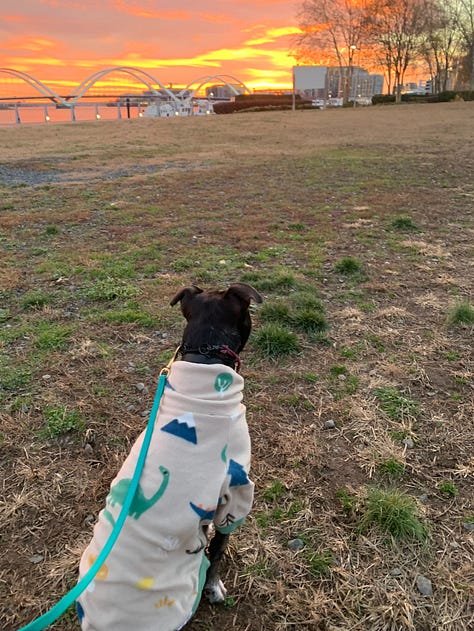

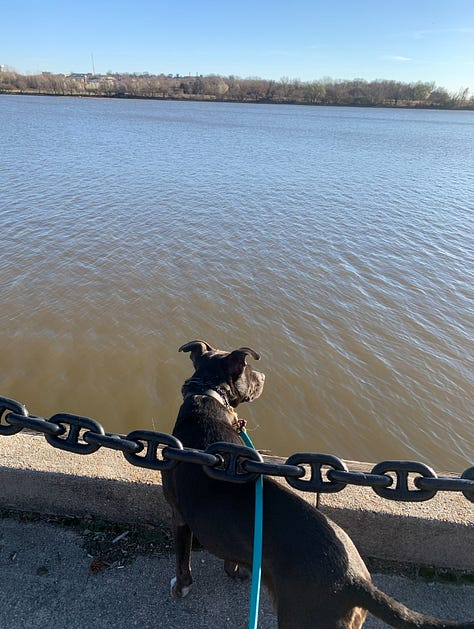
More tactically, I’ve thought about some of my political priors.
I received incredible quality care from some of the best hospitals in the world, including state of the art surgery and cancer treatment. I was unbelievably fortunate to have access to that care and the innovation that made it possible.
But, without insurance, I never could’ve afforded it. Looking at what the bills were before my very generous insurance made clear that getting sick in America, through no fault of your own, can also be an unbearable financial weight. More than 40 percent of Americans have medical debt. I’m incredibly fortunate not to. We should do more to make the phrase ‘medical debt’ (something people in many other developed nations can’t fathom) obsolete.
As a patient, the experience taught me not to ignore when something feels off. I know health and wellness are fraught topics these days, overly politicized and flush with both a new cultural hypochondriasis around Covid and deeper urges to act fine and healthy. My two cents is that you shouldn’t skip your annual check ups and if something feels off, you should go to a doctor. Especially if you might be wired to do or think otherwise.
I think it’s also changed the way I think and write (and tweet). I try to focus my efforts on things I think matter, and avoid things I think are more trivial. Even on topics I think are important, I’m less smash-mouth-y in my perspective, maybe less well-adapted to the blood sport of politics. I’m less angry, earnestly and performatively. These things matter, but so many things matter more.
More than anything, I think (at least, I hope) the experience has made me more grateful. Grateful for the big things — like God’s grace — and the little things, too. Like a walk in the woods.















Dad and I were in awe of you throughout your entire cancer journey. You never once complained or did the "why me?" and your optimism helped get us through our scariest year as parents. Your courage and positive attitude are truly awe inspiring and we are incredibly proud of you and we are so thankful you had J your side. She's as amazing as you are and you make a wonderful couple. Mom
Your Mom and I can't take credit for getting you The Cancer Cookbook. You suggested it to us!
You also did an excellent job of keeping the scariest details away from us. Thank you.
I can honestly and objectively say, as a former editor and writer for newspapers and magazines, that you are an excellent writer.
Love,
Dad